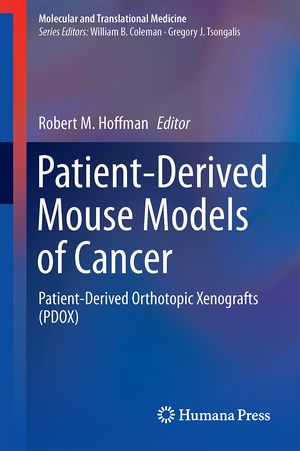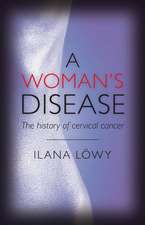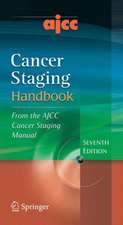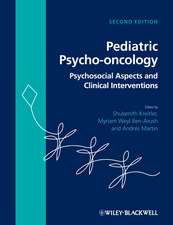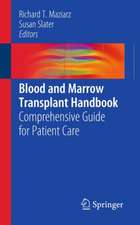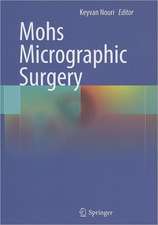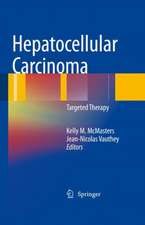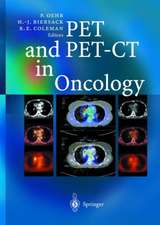Patient-Derived Mouse Models of Cancer: Patient-Derived Orthotopic Xenografts (PDOX): Molecular and Translational Medicine
Editat de Robert M. Hoffmanen Limba Engleză Hardback – 14 aug 2017
This text highlights seminal discoveries and also provides comprehensive and state-of the-art approach to mouse models of human patient tumors. These areas include training, basic techniques, as well as general troubleshooting. Subsequent chapters focus on the different mouse models of patient tumors including the various strains of immunodeficient mice currently available and the transplantation techniques that can be used as well as state-of-the-art imaging techniques. Practical applications of the models from drug discovery, genome analysis to personalized treatment are also covered. Written by experts in that field, each of these sections address these critical issues. A brief review of the existing literature addressing the particular topic follows in each section.
Presently, there is no single source to provide information on technique and uses of mouse models of human patient tumors. Patient-Derived Mouse Models of Cancer will satisfy this need for cancer researchers, oncologists, pharmaceutical and biotechnology industry scientists as well as molecular biologists studying in vivo systems
| Toate formatele și edițiile | Preț | Express |
|---|---|---|
| Paperback (1) | 557.71 lei 38-44 zile | |
| Springer International Publishing – 15 iun 2018 | 557.71 lei 38-44 zile | |
| Hardback (1) | 783.75 lei 38-44 zile | |
| Springer International Publishing – 14 aug 2017 | 783.75 lei 38-44 zile |
Din seria Molecular and Translational Medicine
- 5%
 Preț: 854.51 lei
Preț: 854.51 lei - 5%
 Preț: 585.93 lei
Preț: 585.93 lei - 5%
 Preț: 520.91 lei
Preț: 520.91 lei - 5%
 Preț: 774.96 lei
Preț: 774.96 lei - 5%
 Preț: 777.15 lei
Preț: 777.15 lei - 5%
 Preț: 1413.93 lei
Preț: 1413.93 lei - 5%
 Preț: 778.44 lei
Preț: 778.44 lei - 5%
 Preț: 778.44 lei
Preț: 778.44 lei - 5%
 Preț: 1108.72 lei
Preț: 1108.72 lei - 5%
 Preț: 1602.06 lei
Preț: 1602.06 lei - 5%
 Preț: 777.91 lei
Preț: 777.91 lei - 5%
 Preț: 1111.26 lei
Preț: 1111.26 lei - 5%
 Preț: 725.96 lei
Preț: 725.96 lei - 5%
 Preț: 922.55 lei
Preț: 922.55 lei - 5%
 Preț: 839.74 lei
Preț: 839.74 lei - 5%
 Preț: 423.99 lei
Preț: 423.99 lei - 5%
 Preț: 1005.63 lei
Preț: 1005.63 lei - 5%
 Preț: 564.47 lei
Preț: 564.47 lei - 5%
 Preț: 651.89 lei
Preț: 651.89 lei
Preț: 783.75 lei
Preț vechi: 825.01 lei
-5% Nou
Puncte Express: 1176
Preț estimativ în valută:
150.02€ • 163.01$ • 126.10£
150.02€ • 163.01$ • 126.10£
Carte tipărită la comandă
Livrare economică 16-22 aprilie
Preluare comenzi: 021 569.72.76
Specificații
ISBN-13: 9783319574233
ISBN-10: 331957423X
Pagini: 310
Ilustrații: XVI, 296 p. 60 illus., 50 illus. in color.
Dimensiuni: 155 x 235 mm
Greutate: 0.58 kg
Ediția:1st ed. 2017
Editura: Springer International Publishing
Colecția Humana
Seria Molecular and Translational Medicine
Locul publicării:Cham, Switzerland
ISBN-10: 331957423X
Pagini: 310
Ilustrații: XVI, 296 p. 60 illus., 50 illus. in color.
Dimensiuni: 155 x 235 mm
Greutate: 0.58 kg
Ediția:1st ed. 2017
Editura: Springer International Publishing
Colecția Humana
Seria Molecular and Translational Medicine
Locul publicării:Cham, Switzerland
Cuprins
In memorium: Jorgen Rygaard (1934-2016) Father of patient derived mouse models of cancer and modern cancer research.- The revival of patient-derived mouse models of cancer: way back to the future.- Patient-derived xenograft models for human cancer, The Freiburg experience.- From Ectopic to Orthotopic Tumor Grafting Sites: Evidence for a Critical Role of the Host Tissue Microenvironment for the Actual Expression of the Malignant Phenotype.- The Effects of the Organ Microenvironment on Metastatic-Cell Gene Signatures.- Techniques for surgical orthotopic implantation of human tumors to immunodeficient mice.- The first patient-derived orthotopic xenograft (PDOX) mouse models of cancer: Cancer of the colon, pancreas, lung, breast, ovary, and mesothelioma.- Patient-derived xenograft models of prostate cancer.- Patient-Derived Mouse Models of Sarcoma.- Cervical cancer patient-derived orthotopic xenograft (PDOX) models.- The use of pediatric patient-derived xenografts foridentifying novel agents and combinations.- Development of Orthotopic and Spontaneous Metastatic Human Tumor Xenograft Models for Experimental Therapeutics.- Use of patient-derived orthotopic xenografts (PDOX) to evaluate transformative cancer therapeutics.- Fluorescent protein-expressing transgenic nude mice as hosts for patient tumors.- Fluorescence imaging of tumors in human patient-derived orthotopic xenograft (PDOX) mouse models: The iPDOX model.- The use of patient-derived orthotopic xenograft (PDOX) models to develop curative fluorescence-guided surgery of cancer.-Molecular characteristics of patient-derived tumor xenografts: genomic similarity to patient tumors and relevance for biomarker discovery.- Complementarity of patient-derived orthotopic xenografts (PDOX) models and molecular profiling for optimal therapy.- 3D Cell Culture Models.- Why patient derived mouse models need to be orthotopic.- Foreward: The future of patient-derived models of cancer.
Notă biografică
R.M. Hoffman has been a cancer researcher since 1965. Dr. Hoffman is the pioneer of the patient-derived orthotopic xenograft (PDOX) mouse model, which is featured in the present volume. Dr. Hoffman is a pioneer in many areas of cancer research described in his almost 1,000 scientific publications that have been cited more than 35,000 times with an h-index of almost 100. Dr. Hoffman is currently a Professor of Surgery at the University of California San Diego and Founding President of AntiCancer Inc.
Textul de pe ultima copertă
This text highlights seminal discoveries and also provides comprehensive and state-of the-art approach to mouse models of human patient tumors. These areas include training, basic techniques, as well as general troubleshooting. Subsequent chapters focus on the different mouse models of patient tumors including the various strains of immunodeficient mice currently available and the transplantation techniques that can be used as well as state-of-the-art imaging techniques. Practical applications of the models from drug discovery, genome analysis to personalized treatment are also covered. Written by experts in that field, each of these sections address these critical issues. A brief review of the existing literature addressing the particular topic follows in each section.
Presently, there is no single source to provide information on technique and uses of mouse models of human patient tumors. Patient-Derived Mouse Models of Cancer will satisfy this need for cancer researchers, oncologists, pharmaceutical and biotechnology industry scientists as well as molecular biologists studying in vivo systems
Caracteristici
The first single source to provide information on technique and uses of mouse models of human patient tumors Written by experts in the field Provides practical applications of the models from drug discovery, genome analysis to personalized treatment
